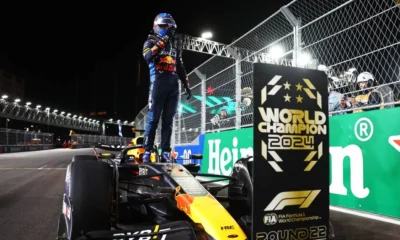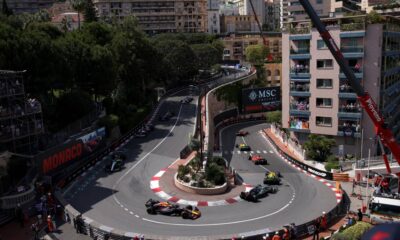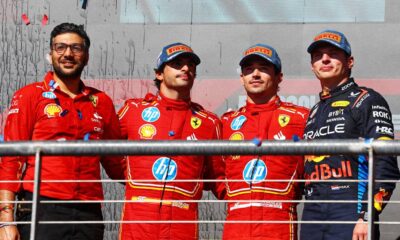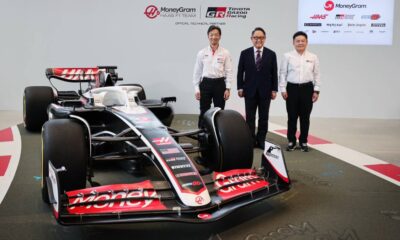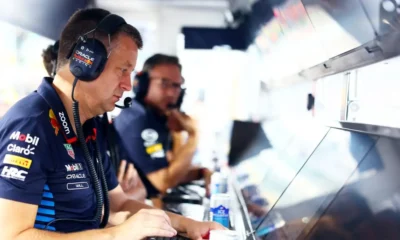Motorsport
Formula 1 teams refuse billions! Its boss Stefano Domenicali spoke about the entry of new teams and F1’s future plans
Formula 1 boss Stefano Domenicali confirmed in a recent episode of the Beyond The Grid podcast that the current grid teams are rejecting billion-dollar buyout offers. The CEO also spoke on the subject of potential new teams and future plans.

Formula 1 boss Stefano Domenicali confirmed in a recent episode of the Beyond The Grid podcast that the current grid teams are rejecting billion-dollar buyout offers. The CEO also spoke on the subject of potential new teams and future plans.
F1 CEO Stefano Domenicali addressed the issue of new teams entering F1 in a recent episode of the Beyond The Grid podcast, confirming that teams are rejecting huge billion dollar buyout offers.
The world’s big car brands, especially in the last two years as the queen of motorsport has experienced another huge boom, have expressed their interest in entering F1. Whether it was Porsche, Andretti with the backing of General Motors or Volkswagen as a brand itself.
Attributes of the Concorde Agreement
All of them have so far failed to enter F1 and it is questionable whether they will succeed at all in the future. Why? Because there is a so-called Concorde Agreement, under which each new entrant must pay a $200 million entry fee, with the money split between the existing teams as compensation.
Then the current version of the Concorde Agreement between the teams, the FIA and F1 also stipulates that the 10 teams split their share of the sport’s revenue and any new entrant would dilute that pool. In addition, F1 boss Stefano Domenicali has also stated that Formula One doesn’t even need any new teams.
Audi and Ford as new brands
Only two new brands – Audi and Ford – have managed to agree to enter the world of motorsport royalty in recent times. The American carmaker will only join Red Bull in supporting powertrain development from 2026, in a collaboration with the Red Bull Powertrains factory.
The Austrian team is set to become a fully-fledged factory team from this very year, producing its own engines, so it will not be sourcing them from other suppliers.
Audi will have its own team, but on a collaborative basis with Sauber. This has been the practice with this team for quite a few years now. In earlier times Sauber worked with BMW, although back then it was mainly for power units.
But the current synergy with Alfa Romeo is already an example of how Audi and Sauber should work in the years to come. We’ve covered this topic in more detail in a previous article.
Domenicali’s statement
Under the current boss, F1 is indeed experiencing a great surge in popularity. This is evidenced by the interest of countries in hosting grand prix events, the growth of partners and the desire of major car companies to enter F1.
One of Domenicali’s goals is to help the existing ten teams to become profitable businesses and not go wild in Formula 1. This will admittedly benefit competitiveness as the teams will have a greater financial backing. On the other hand, it makes Formula 1 a closed society.
“Two years ago, when the new Concorde Agreement was signed, when they talked about the value of a team coming into Formula 1, the figure of $200 million was quoted. That seems out of reach,” Domenicali said on the Beyond The Grid podcast.
“In the past, there have been teams that we’ve sold for £1. Now the market is offering teams almost a billion – and they’re refusing. Can you imagine that? The more you are able to have a competitive field, the more interesting races you have. The more you can create interest in the sport,” he said.
The FIA process
The president of the Federation Internationale de l’Automobile (FIA) said about six months ago that he wanted to start a process to make it easier for new brands to enter Formula One. However, Domenicali’s response has been more than lukewarm.
According to the current F1 boss, ten teams is more than enough. Such a number is said to be ideal for ensuring a show and a thriving business. However, all aspects related to the potential recruitment of new teams are currently being evaluated. This means profitability, competitiveness or technical readiness.
“We have to remember that it (the Concorde Agreement) expires in 2025, so there is still a long time to go. It is an assessment that we have to make in order to make the right decision in the future,” Domenicali concluded.
F1, Beyond The Grid, Racing News 365

